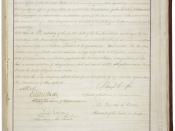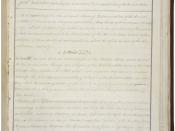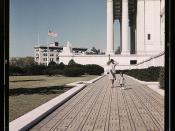Reynolds v. United States
Argued/Decided-1878
1st amendment-religion
Reynolds, a Mormon in Utah, married a second wife in breach of pertinent the Utahl law. He argued that it was his duty to practice polygamy as a member of the Church of Jesus Christ of Latter-Day Saints. He requested the court to instruct the jury that if they found that he had married in pursuance of and conformity with what he believed at the time to be a religious duty, their verdict should be "not guilty". The Court had to decide if the Utah law violated the first amendment. The court instructed the jury that if Reynolds, under the influence of a religious belief that it was right, had "deliberately married a second time, having a first wife living, the want of consciousness of evil intent--the want of understanding on his part that he was committing crime--did not excuse him, but the law inexorably, in such cases, implies criminal intent."
Schenck v. United States
Argued-1919, Decided-1919
1st amendment-freedom of speech
During World War I, Schenck mailed letters to draftees saying how they shouldn't give into the "capitalist system" and to petition to repeal the Conscription Act. Schenck was then charged with conspiracy to violate the Espionage Act by attempting to cause insubordination in the military and to obstruct recruitment. The Court had to decide whether Schenck's actions protected by the 1st amendment-freedom of speech. Holmes (speaking for a unanimous Court) ruled concluded that Schenck was protected in this particular situation. During wartime, utterances tolerable in peacetime may be punished
Gitlow v. New York
Argued/Reargued-1923, Decided-1925
1st amendment-freedom of speech and press (publication)
Gitlow, a socialist, was arrested for handing out copies of a "left-wing manifesto". In the hand out, it called for institution of socialism through strikes and class action of any...


